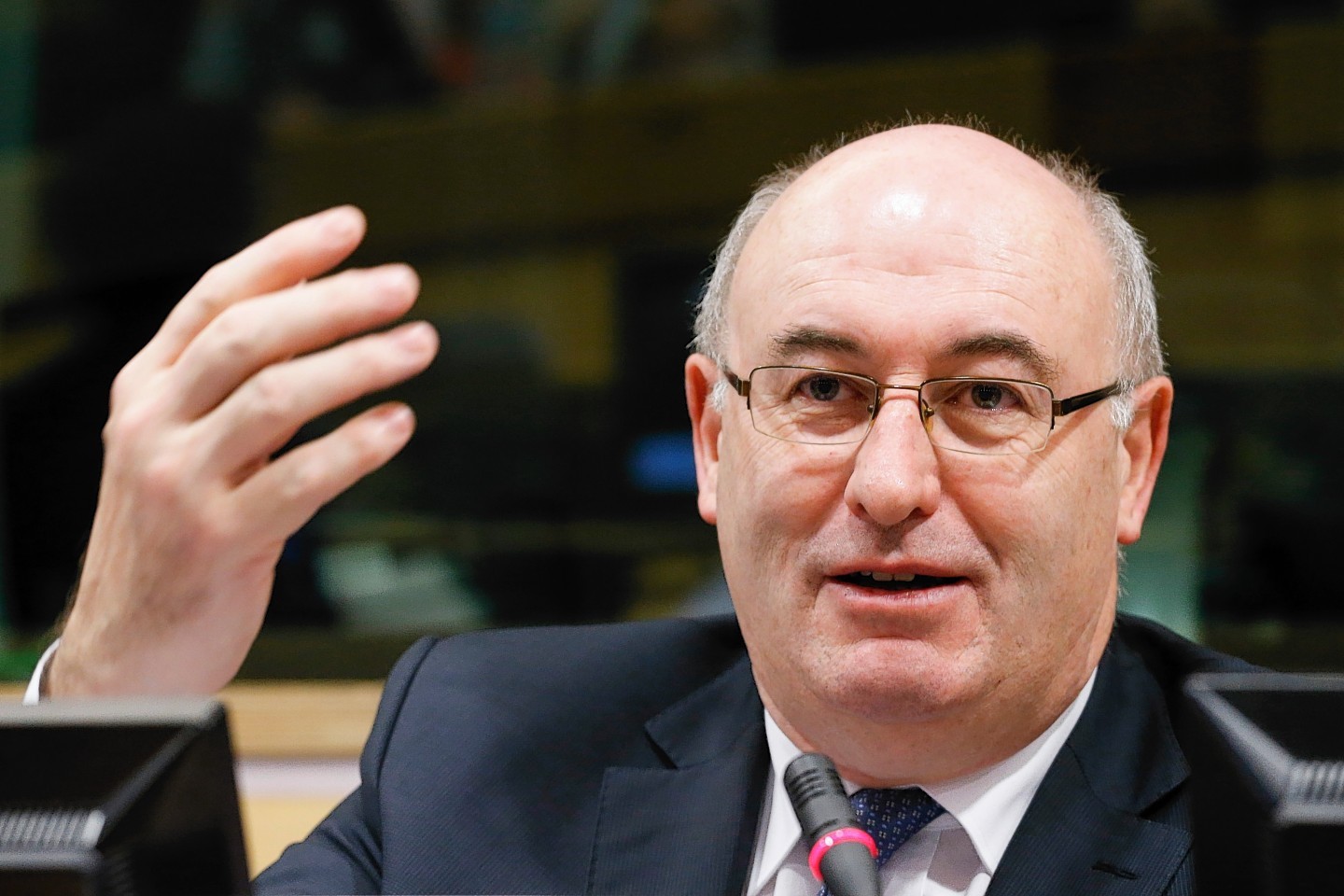Our European political commentator and former MEP George Lyon caught up with EU Agriculture Commissioner Phil Hogan ahead of his visit to next week’s Royal Highland Show
At 6ft 5inches tall, big Phil Hogan is a man who stands out in a crowd so Scottish farmers should have no problem spotting him when he comes to the Royal Highland Show next week.
I first came across him striding across the road from the Berlaymont building in Brussels to the Old Hack pub heading for a pint with some of the boys after work.
In some ways this encapsulated the easy going, affable, approachable and engaging style that big Phil has brought to the job of EU Agriculture Commissioner.
Last month, I said to him Scottish farmers would want to know, if he understood their industry and what he would be doing to assist them in these difficult times. His robust response emphasised his strong farming roots and rural background in Ireland where, as one of four children, he was brought up on a 120-acre mixed family farm in Kilkenny.
After university, he set up a small insurance and auctioneering business prior to becoming involved in local politics in the early 1980s. His first step on the political ladder saw him elected chairman of Kilkenny County Council; he was just 25 years old and Ireland’s youngest Council Chairman.
This was followed by 25 years as MP for the strongly rural constituency of Carlow and Kilkenny; a position he held right up until his appointment as Commissioner last year.
In his younger days he spent weekends and school holidays helping his father with the cattle and milking the cows. His brother now farms the same 120 acres in Kilkenny.
His hands on experience along with 25 years of dealing with farming issues in his constituency provides him with a well of knowledge to draw on, in understanding the challenges Scottish farmers are facing.
With dairy prices crashing, I then asked him what he was going to do to help milk producers, especially those on the islands, who are struggling to survive.
This, he said, was an issue primarily for the Scottish Government where they had to use the substantial powers and flexibility given to them in the new Common Agricultural Policy (Cap) to support farmers who were facing real difficulties.
He saw his role as Commissioner as opening up new markets and new opportunities for EU farm exports.
He pointed to some successes in finding alternative markets for EU dairy and pork exports locked out of the Russian market as a result of the trade ban.
He also highlighted his recent efforts for a lowering of fertiliser prices and he called on Scottish farmers to submit to him any evidence they had of collusion in the UK fertiliser market.
When asked how he planned to simplify the new Cap, his initial response was to remark that many colleagues thought he was mad to take this issue on as so many others had tried and failed in the past.
Then Hogan said the answer to reducing Cap complexity was to put practical common sense at the heart of its implementation. He believed the package of measures he is bringing forward will reduce the amount of paperwork for both farmers and Member States.
With many farmers in Scotland believing the EU is hostile to innovation, I asked if there was a risk of Europe becoming uncompetitive.
Again Hogan pointed to his background as Irish Environment Minister where he supported intensive agriculture and went against stronger environmental protection.
He went further saying he supported advances in science and technology. “We need more research and innovation in agriculture. Agritech is the way of the future,” he said.
Putting money behind that statement, he pledged that the 4.6billion euros (£3.36billion) of ‘Innovation’ funding would be spent on ensuring “farmers could produce more with less and meet the demand with greater yields”.
In short, Hogan’s long term goal is to not only put EU agriculture at the centre of the food security agenda globally but also to ensure there is a competitive EU farming industry able to take advantage of substantial trade opportunities.
Back home Hogan was Taoiseach Enda Kenny’s right hand man, a bit of a bruiser responsible for introducing property taxes, water charges and culling hundreds of local Government council seats all deeply unpopular.
In his short time in Brussels he has drawn on his lifetime political experience to build real influence and clout around the Commission table. All of this is good news for farming.
The motto on his office wall says “Whatever you want to do, do it. There are only so many tomorrows.”
With no shortage of challenges facing our industry, farmers will be hoping that he gets on and does it.
